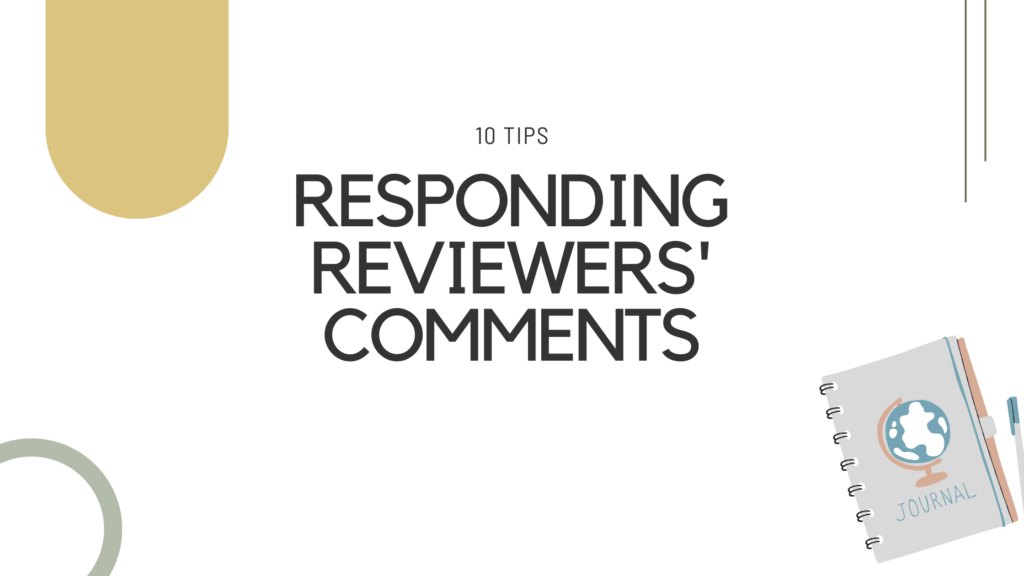
Responding to reviewers’ comments is a crucial phase of the academic publishing process, so it is necessary to take the time to carefully address all feedback received. In this blog post, we are going to discuss simple tips and guidelines to help you prepare a detailed and effective response that demonstrates your commitment to improving your manuscript.
1. Read and Organize
First, it is important to carefully read and understand the reviewers’ comments. Then, it is recommended to create a table or spreadsheet to organize the comments and track your progress as you address each one. This can also help to identify any common themes or issues raised by multiple reviewers.
2. Prioritize the Most Important Comments
Some reviewers may make several comments, so you will need to prioritize the most important comments that you feel will have the greatest impact on improving your manuscript.
3. Revise Your Paper Thoroughly
When revising your paper in response to reviewer comments, be sure to carefully read through your revised manuscript to ensure that all comments have been addressed and that any changes are clearly explained.
4. Use Clear and Concise Language
Be sure to use clear and concise language when responding to reviewers’ comments. Avoid using confusing language that may make it difficult for the reviewers to understand your response. Additionally, avoid making vague or general statements, such as “we have revised the manuscript as suggested.” Instead, provide specific details on how you have revised the manuscript.
5. Address Point by Point
Address each comment point by point and provide a detailed response that demonstrates how you have revised your manuscript in light of the feedback. Be sure to provide references or additional information where necessary to support your response.
6. Avoid Becoming Defensive
Avoid becoming defensive or confrontational in your response. Instead, focus on providing a clear and objective explanation of how you have addressed the feedback.
7. Show Respect
Reviewers may have criticisms of your paper that you do not agree with or find unfair, but it is important to remain respectful and professional in your response. Always thank the reviewers for their time and feedback, even if you do not agree with everything they have said.
8. Incorporate Feedback From Others
If you have colleagues or mentors who are experienced in publishing academic papers, it may be helpful to ask for their input on your response to reviewers’ comments. They may be able to provide valuable feedback on your revised manuscript or suggest additional ways to address the feedback.
9. Follow Journal Guidelines
Be sure to follow any specific guidelines or instructions provided by the journal for responding to reviewers’ comments. Some journals may have specific formats or requirements for response letters.
10. Use a Template
You can create your own template to use every time you are going to prepare to reviewers’ comments. A common template for responding to reviewers’ comments on an academic paper may include the following sections:
Introduction
Thank the reviewers for their time and constructive feedback. Reiterate the title and the aim of the manuscript for context.
Response to Individual Comments
Address each comment made by the reviewers, referring to them by the assigned number or letter. Explain how you have addressed each issue or question, and provide further supporting material where appropriate. This could involve stating where and how changes have been made or providing references to additional research.
Response to General Comments
If the reviewers made any overall comments about the structure or tone of the manuscript, summarize these and explain how you have responded.
Conclusion
Thank the reviewers again for their valuable input and restate your commitment to further improving the manuscript. Invite the reviewers to raise any further concerns or questions if necessary.
Here’s an example of how you could write the introduction to the response to reviewers’ comments:
Dear Reviewers,
Thank you for taking the time to review our manuscript, [Manuscript Title]. We appreciate your valuable feedback and suggestions, and have made appropriate revisions to the paper based on your comments.
In this response letter, we address each of your comments in turn and describe how we have revised our manuscript accordingly. We hope that we have been able to address your concerns and further strengthen our work.
Thank you again for your thorough and insightful review. We hope that the revised manuscript meets your satisfaction and look forward to hearing back from you.
Sincerely,
[Your Name]
In conclusion, responding to reviewers’ comments can be a daunting task for researchers, but by following these guidelines, it is possible to prepare a detailed and effective response that addresses all of the feedback received.
Do you need professional assistance in English editing, proofreading, formatting your paper according to the journal’s guidelines, and selecting the most appropriate journal for your manuscript? Look no further! We offer these services and more to help you ensure that your paper meets the highest standards of academic publishing. Contact us for a quote and to learn more about how we can help.
play youtube,
vvlx,
xporn,
xporn,
xnxx,
xxx,
down tiktok,
Connor Turnbull,
Stephanie Ruhle,
Luke Macfarlaneare Banks Closed Good Friday,
Super Mario Bros Number,
How Do I Free Up Space On My Iphone,
Box Score For World Series,
Aurura,
Usa Economy,
Netflix Premium,
Lookout Tower Paw Patrol,
How Many Belts Does Devin Haney Have,
Average Pornstar Salary,
Cso Criminal Search Bc,
